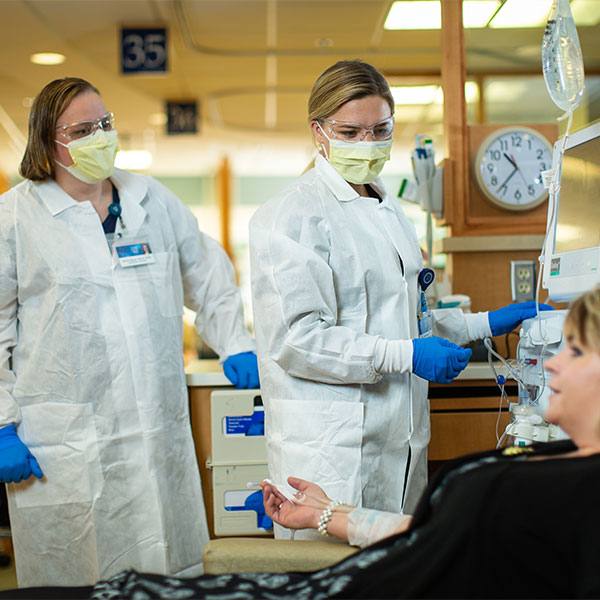-
Biotherapeutics
The pivotal role of nursing in regenerative medicine
Nurses are uniquely positioned to counteract a pandemic of chronic diseases by integrating regenerative medicine into patient care, a Mayo Clinic study finds. To execute this pivotal role, the stalwarts on the frontlines of health care should stay abreast of research, be trained in regenerative education and embrace new regenerative technologies, according to the paper published in the Journal of Nursing Scholarship.
Regenerative medicine seeks to repair, replace or restore diseased cells, tissues or organs to improve overall health. Mayo Clinic's Center for Regenerative Medicine is galvanizing this movement by driving regenerative innovations that change the focus of care from treating disease to rebuilding health.
An aging population has triggered a surge in conditions such as diabetes, heart disease, cancer and arthritis that reduce quality of life and impose significant costs on the health care system. Patients with these conditions don't always respond to conventional treatments. The Mayo Clinic study finds an opportunity for nursing to educate patients about, administer and follow emerging regenerative therapies that could augment standard care and integrate these technologies into modern practice.
To harness the potential of nursing in advancing regenerative care, the Mayo Clinic paper makes several recommendations.
Draw on patient-centered research and data
Nurses will be called upon to integrate the newest science-validated regenerative therapies into patient care. Keeping abreast of evidence-based research can guide nurses on best ways to administer therapies to manage unmet patient needs.
“Regenerative medicine’s focus on restoration of health and function is integral to the practice of nursing. Nursing has the opportunity to lead and contribute to evolving, cutting-edge regenerative technologies with science-based care. As new regenerative therapies evolve, nursing will play a key role in conducting research to determine short- and long-term outcomes including symptom management as well as function and well-being. Further, nurses will contribute significantly to educating patients about regenerative self-management to promote optimal quality of life,” says Ryannon Frederick, chief nursing officer, Mayo Clinic.
Educate through fellowships and other opportunities
Because regenerative medicine is new to most health care professionals, it is difficult to gauge how knowledgeable the global nursing community is about regenerative technology. Educating, developing and deploying a skilled nursing workforce is needed through opportunities such as dedicated fellowship and certificate programs.
“The future of health care has arrived in the form of cutting-edge regenerative technologies. It is imperative that nurses educate themselves about the vast array of regenerative technologies that will be making their way into practice and contribute to the science necessary to ensure evidence-based care for patients,” says lead author Linda L. Chlan, Ph.D., associate dean for nursing research at Mayo Clinic.
Integrate regenerative medicine technologies into nursing
Examples of new regenerative technologies include cartilage-derived cells use for repair of cartilage defects and mesenchymal stem cells for addressing graft-versus-host disease. Immunotherapies such as chimeric antigen receptor, or CAR-T, cell therapy offer potential for healing by unleashing the body's immune system to search for and destroy cancer.
"Nurses are qualified to identify and manage potential long-term side effects of regenerative therapies as well as pay attention to ethical considerations around regenerative therapies," Dr. Chlan says.
Embrace regenerative medicine’s future in health care
The regenerative toolkit is expanding, with new validated procedures moving from research to practice to transform the future of health care. A deeper understanding of disease may enable nurses to use regenerative procedures to go beyond caring for symptoms and target the underlying cause of disease.
"There is increased readiness of the practice to adopt new regenerative therapies that may heal damaged tissue, halt disease progression and restore form and function. Nursing is poised to be on the leading edge of bringing new options for hope and healing to patients," says senior author Andre Terzic, M.D., Ph.D., director, Mayo Clinic Center for Regenerative Medicine.
Delivery of regenerative care to those who are most likely to benefit, including to patients in underserved communities, is the central aspiration. Nursing is well positioned to lead symptom investigations, to compile data sets and build data analyses of long-term health outcomes of regenerative procedures. Big-data analytics may make it possible to match therapies to patients who are most likely to respond. Nurses may usher in a new era of regenerative health care that is accessible and equitable for all.
Dr. Terzic is the Michael S. and Mary Sue Shannon Director, Mayo Clinic Center for Regenerative Medicine, Marriott Family Professor in Cardiovascular Diseases Research, and Marriott Family Director, Comprehensive Cardiac Regenerative Medicine.
####










